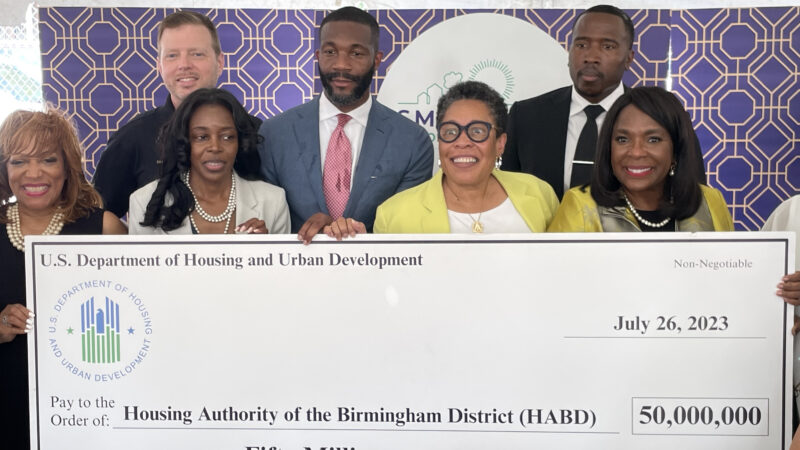$50 million HUD grant expected to “transform” west Birmingham neighborhoods
Officials celebrate $50 million HUD Choice Neighborhood program grant award to Birmingham. From left to right: Birmingham City Council President Wardine Alexander; City Council District Five Rep., Darrel O’Quinn; Housing Authority Birmingham District CEO Dontrelle Young-Foster; Birmingham Mayor Randall Woodfin, HUD Secretary Marcia Fudge; City Council District One Rep., Clinton Woods; U.S. Rep. Terri Sewell.
In a setting that felt more like a tent revival than a press conference, Housing and Urban Development Secretary Marcia Fudge announced Wednesday that Birmingham had landed a $50 million community redevelopment grant.
The highly anticipated news was met with cheers and applause from a crowd that spilled out of a small tent that offered shade against a blistering summer sun. Many of those in attendance had been pushing for the grant for years.
“They have hounded me for the last two and a half years about this grant,” Fudge said, only half-jokingly. “But when a community comes together to say that we want to make a change, that we want to preserve the history that has made Birmingham part of what it is. That we want to, once again, let people who live here live with decency and respect …
“Well, Fudge continued, “I’m just glad to be a part of it.”
Choice Neighborhood Grant
The money comes from HUD’s Choice Neighborhood program and will be used to redevelop the west Birmingham neighborhoods of Smithfield, Graymont, and College Hills. The city is one of just two communities nationwide to win the HUD grant in this amount, the largest of its kind.
The grant leverages public and private dollars to address struggling neighborhoods with distressed public housing. The funds will be used to build more than 1,000 subsidized, affordable and market-value homes to replace the 900 units of the venerable Smithfield Court, the city’s oldest public housing site that was built around the time of World War II.
$300 million for west Birmingham
The HUD money gives a major boost to the city’s efforts to revitalize the area. Birmingham had already committed nearly $250 million to the effort that includes moving and reimagining the Smithfield Library, and the addition of new commercial, educational and medical facilities.
Birmingham City Councilman Darrell O’Quinn, who represents the area, says the HUD funds will kickstart a major overhaul.
“This is going to be transformative in every sense of the word,” he said. “The folks here currently have poor access to health care … healthy foods, workforce development opportunities. You just sort of go down the list.
“And,” O’Quinn continued, “all of those things are going to be addressed in this new development.”
At the press conference to announce the grant, Birmingham Mayor Randall Woodfin alluded to the revival atmosphere, asking the crowd, “Is the Holy Ghost in here?” In the midst of cheers from the audience, he then mentioned the blessings that he believes the grant brings.
“With these funds, we will build nearly 1,000 new affordable homes in Smithfield. And we will also build and provide and support wraparound services for these residents.
“But,” he continued, “this is not just about place, everybody. This is also about people in the collective, in the wrap around services. Place and people—that’s how you revitalize a community.”
Honoring the legacy of west Birmingham
Speakers also alluded to the area’s role in Birmingham’s civil rights struggle.
U.S. Congressperson Terri Sewell, whose district includes the neighborhoods, said the investment is a “catalyst for change, change for the better, for economic revitalization of this amazing place.”
“It’s about honoring the legacy, the very proud legacy that is this place,” Sewell said.
As she was leaving the event, a reporter asked HUD Secretary Fudge why this section of Birmingham received the grant, again the largest of its kind. She thought for a moment, and while walking away, looked over her shoulder and said, “Because it’s such a historic place.”
Pentagon puts Scouts ‘on notice’ over DEI and girl-centered policies
After threatening to sever ties with the organization formerly known as the Boy Scouts, Defense Secretary Hegseth announced a 6-month reprieve
President Trump bans Anthropic from use in government systems
Trump called the AI lab a "RADICAL LEFT, WOKE COMPANY" in a social media post. The Pentagon also ordered all military contractors to stop doing business with Anthropic.
HUD proposes time limits and work requirements for rental aid
The rule would allow housing agencies and landlords to impose such requirements "to encourage self-sufficiency." Critics say most who can work already do, but their wages are low.
Paramount and Warner Bros’ deal is about merging studios, and a whole lot more
The nearly $111 billion marriage would unite Paramount and Warner film studios, streamers and television properties — including CNN — under the control of the wealthy Ellison family.
A new film follows Paul McCartney’s 2nd act after The Beatles’ breakup
While previous documentaries captured the frenzy of Beatlemania, Man on the Run focuses on McCartney in the years between the band's breakup and John Lennon's death.
An aspiring dancer. A wealthy benefactor. And ‘Dreams’ turned to nightmare
A new psychological drama from Mexican filmmaker Michel Franco centers on the torrid affair between a wealthy San Francisco philanthropist and an undocumented immigrant who aspires to be a dancer.







